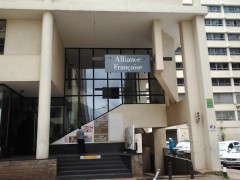Agenda for the East Africa Future Day in Nairobi, 12 November 2012

As part of its Trend Monitoring and Horizon Scanning function in the Greater Horn of East Africa, the Society for International Development will organize a Future Day in collaboration with Future Challenges and the Rockefeller Foundation around questions of regional integration – how this is being perceived by its citizens and how they think it will affect their lives, both in positive and negative terms. In particular, this event will try and capture ideas of how the young citizens of the region view the ‘periphery’ – those neighboring countries which are not part of the East African Community (EAC) process but whose affairs nonetheless have a significant impact on the community.
Agenda for the East Africa Future Day in Nairobi, 12 November 2012
[issuu width=420 height=297 backgroundColor=%23222222 documentId=121111140804-395ddcf1acf0449387c19f2187e34782 name=future_day_agenda username=futurechallenges tag=development unit=px v=2]
If you’re interested in the latest news from the Future Day you should take a look at our blog on Tumblr.
In recent months, East Africans have come to realize much more keenly the extent to which the northern and western fringes of the community (Somalia, Ethiopia, Sudan and the DR Congo) influence the daily goings-on in the region. Beyond the conflict potential that is frequently the subject of media attention, there are increasingly evident a number of business and development opportunities that the region can take advantage of. The common effort by the states in the expansion of the port, road and rail infrastructure into South Sudan and Ethiopia are indicators of this potential and are exciting a number of traders and investors.
Promotion Video for the East Africa Future Day in Nairobi
http://www.youtube.com/watch?v=9NIjH7hDa9U&feature=plcp
But beyond the commercial potential that the EAC and its neighboring countries offer to investors, what really do its citizens, and in particular, its youth think? The role of the youth in the regional integration process is rarely given a thought beyond reflections on the ‘problem potential’ of large hordes of unemployed youth (East Africa is one of the youngest regions in the world today) and their participation in the culture and arts. The East Africa Future Day will aim to explore the hopes and fears, the opportunities and challenges of some of the region’s younger citizens as they look towards a regionally integrated future through two thematic entry points: ecology and security. These entry points have been selected if only for the fact that they are, arguably, the two key pillars that underpin livelihoods. With more than 50% of the region’s population dependent on agriculture and related services, the ecology and what happens to it should be a critical concern for as they look to the future. Furthermore, security – looked at from a dual prism of ‘state security’ as well as ‘human security’ aims to explore both its hard and soft aspects. Hard aspects are perhaps more easily related to as these regard the integrity of our states, their borders and the ability to maintain control over violence. The ‘soft’ aspects of security will seek to understand the extent to which individual and communal livelihoods are facilitated and sustained by the economic, social and political choices that regional integration contemplates.
The conversations that the Future Day will explore will be broad and build on initial, brief expert presentations to set the scene with global and regional trends. Subsequent small-group and plenary discussions will delve further into shared experiences and aim to explore the different facets of the issues raised as seen from around the region. In particular, the Future Day will seek to focus attention around the development challenges that the region faces and the ideas that the youth have to try and address them as well as how these challenges are shaping their individual choices. What are the hopes and fears of this generation of young East Africans? What are their views with regard to inter-generational dialogue? How do they think regional integration impacting on the poor and/or marginalized population groups (urban poor, pastoralist and nomadic peoples; IDPs and refugees, etc.)? Will regional integration generate (even more) economic migrants who choose to leave for the Middle East and beyond?
This EAFD will seek to sow the seeds for a broad conversation about the regions opportunities and what priorities it should focus on. By aiming to bring in voices from different parts of the EAC (and beyond) through live chats, call-ins and taped messages in addition to a documentary shot in various countries of the region that samples views and opinions on regional integration, the EAFD seeks to celebrate the diversity of the region and highlight its most precious asset – the ideas and aspirations of its youth. Furthermore, by engaging them in a wider conversation with their ‘seniors’, it also seeks to generate a space where they can earnestly explore ideas and challenge each other in their search for and contribution to a broader development vision for the region. SID’s vision is to have a truly regional conversation – if only for a short day – about the potential of East Africa and the wisdom of its people.
Update:
Our bloggers Ruth Aine Tindyebwa and Kennedy Kachwanya have written blogposts with their personal impressions from the Future Day in Nairobi.
Ruth Aine Tindyebwa: What happens when YOUR problems and MY problems become OUR problems
Kennedy Kachwanya: Future Day Part 1 – Hear what they say but pay more attention to what they don’t!
Kennedy Kachwanya: Future Day Part 2 – Hear what they say but pay more attention to what they don’t!
Tags: Bertelsmann Foundation, Development, East Africa, Future Day, Kenya, Nairobi, regional integration, Rockefeller Foundation, Society for International Development

